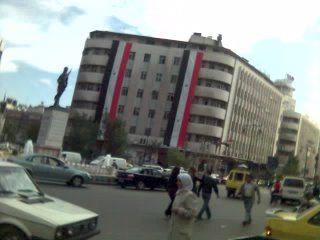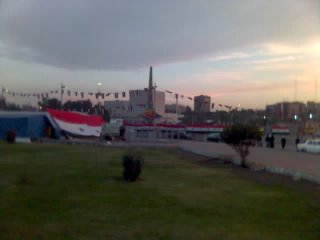




In what is manifestly the wrong time to be leaving Syria, I depart for Tehran tomorrow evening. For those out of the loop, a little background.
Lebanon: Explosion on February 14th 2005 killed former Lebanese Prime Minister Rafiq Hariri as well as 22 others. UN sets up team to investigate. One report published soon after ("the Fitzgerald Report"), followed by another ("the Mehlis report [pt.1]") on 19th October, soon to be followed by the final installment on December 15th. In the interim period, Syrian troops were essentially forced out of the country on account of a popular movement (peaceful in nature) as well as strong international pressure in the wake of the Hariri bombing. There have been assassinations and killings of anti-Syrian journalists (most notably yesterday morning Gibran Tueni, MP and editor of Al-Nahar newspaper, died in a car-bomb) as well as sporadic bombs in Christian quarters of Beirut. There is a strong anti-Syrian feeling within Lebanon.
Syria: As part of the 'axis of evil', Syria faces strong pressure to issue wide-ranging reforms in order to 'give democracy and freedom' to her people. Resisting such designs on Syria and alleged US plans of regime change by force, Bashar al-Assad has decided to take a stand in the face of mounting international pressure. A senior intelligence officer who was stationed in Lebanon during the civil war, Ghazi Kenaan, allegedly committed suicide recently too. Syria remains accused of playing a significant role in the Hariri bombing, and it is expected that the upcoming report on Thursday will come down heavily upon Syria.
[from a report by Al-Nahar: "They said the report will include three main elements: Strong evidence that Syria has been uncooperative, thus violating its commitments and pledges; a recommendation for the questioning of Syrian and Lebanese officers and politicians; and the creation of an international court to try suspects in the Hariri murder.
Quoting a diplomatic document, senior U.S. diplomats, said that as a consequence to the Syrian stance, the Security Council might impose sanctions on Syrian officials: the president, members of the Syrian Parliament, the prime minister, the defense minister and the foreign minister. Under the sanctions, Security Council member states will be prohibited from hosting these officials and their assets will be frozen."]
On November 10th, Bashar al-Assad made a speech at the University of Damascus, in which he laid out a systematic answer to many of the international "grievances". As a rallying cry to the country, it was a strange speech to listen to. Designed to appeal to the young, and with many odd academic and scientific metaphors (including one referring to cell metabolism), the speech covered the whole gamut of issues facing Syria, even taking time out to allege that Arafat was poisoned in Palestine by Israeli agents. The speech similarly set up Syria as victims, a sentiment that is much present within ordinary Syrians. "It is only natural that they should blame Syria," he said. On Iraq and the issues facing the neighbor country: "Ultimately, no one will stand by Iraq except its Arab sister states". The speech made much of traditional pan-Arab links, to which I guess he sought to appeal. There were expressions of friendship to "sister Lebanon". A story of the rape of a family is told. Shall we let this happen to Syria, he asked? "If there are mistakes in the state, we all discuss them at home, but we will not allow anybody to talk about them from the outside." After all, as he stated, "social cohesion is increasing". He listed a series of reforming measures that he had initiated.
At any rate, since then we've had the allegations that Hariri's son (Sa'ad, in Beirut) had offered money to a Syrian to falsely testify to the UN Mehlis comission. This was revealed in a press conference and TV interview held in Damascus two weeks ago. Also notable was that this claim was immediately taken as fact by many Syrians, thus "discrediting the sham of the Mehlis investigation" as one friend put it. Also you may have read of the deaths of several "terrorists" north of Damascus near Aleppo. These reports of SANA [The Syrian Arab News Network], which make their way onto BBC News seemingly without confirmation, are obviously useful for the Syrian regime, allowing it to boast that it too has a problem with 'terrorists' within Syria. It has since been claimed that the attacks in the north were by Syrian forces on offices of a political opposition movement. Al Seyassah, Kuwait, claimed in the same report via a source in Paris that Aleppo is due to become 'the new Hama', and that often these attacks on 'terrorists' were simply operations against political or religious bases of opposition (such as the Ikhwaan el-muslimiin, the Muslim Brotherhood, who offer the most serious opposition to the current regime).
Journalists covering Damascus do so from the comfy vantage-point of Beirut to the obvious detriment of that same coverage. There have been several confirmed reports of US nationals (uni students reading Arabic at AUB, the American University of Beirut) being refused entry on the border between Lebanon and Syria. I myself, to clarify in Syria's defence, have seen Americans obtaining visas without problem at the border on each of the 3 times I returned from Lebanon in the last month.
As you can see from the photos, banners and flags have been draped over many parts of Damascus. Slogans are printed across them: "God will protect you, Syria!", and "Resistance and Islam", as well as "We condemn trading in Al-Hariri blood!" (pictured). A small graffiti has had the good fortune to remain on the stairs of a Syrian national monument up in Muhajerine: "Fuck You U.S.A.".
Demonstrations happen often, either of the official kind or the spontaneous lets-get-together-after-work-and-walk-in-the-streets-of-damascus-and-show-our-conviction kind. One of the mobile networks, with connections to the regime's leadership, sends out txt messages (in Arabic) letting people know when and where the big demonstrations will be. University students, as well as the large masse of state employees are 'encouraged' to attend these rallies.
The reaction 'on the street' varies quite a lot. Iraqi refugees living in Damascus are understandably more concerned with the elections taking place in their country on the same day as the release of the Mehlis report to the public (it has already been submitted in secret to the UN). However, they realise the singular importance of the upcoming Mehlis report (pursuant to UN Security Council resolution 1595 (2005)). Taxi drivers don't seem to give a shit really, no matter what you ask them. They're too busy working two or three jobs just to make ends meet. I can't bear to imagine the damage that a serious round of newly-imposed sanctions would inflict on ordinary Syrians.
At any rate, I'll be in smog-paradise, or Tehran, from Wednesday. I finished rereading John Gray's Al Qaeda and what it means to be modern and started, with much glee, Karen Armstrong's A Short History of Myth. For those of you looking for a good book on recent-ish Syrian politics etc, check out Neither Bread Nor Freedom by Alan George, an excellent primer on the post-Hafez al-Assad period...

0 Comments:
Post a Comment
<< Home